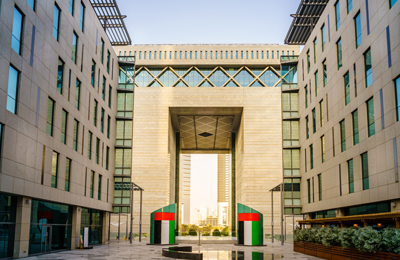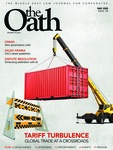DIFC Courts Strategic Work Plan approved

His Highness Sheikh Maktoum bin Mohammed bin Rashid Al Maktoum, Deputy Ruler of Dubai, Deputy Prime Minister, Minister of Finance and President of the Dubai International Financial Centre has approved the Dubai International Financial Centre (DIFC) Courts Strategic Work Plan 2022- 2024.
Encapsulated within a four-pillar mandate, the new three-year plan outlines an ambitious drive for full digital transformation through advanced technologies to increase the efficiency of dispute resolution. A new hyperconnected judicial network will also be developed alongside cutting-edge legal procedures for enhanced accessibility to court services.
H.H. Sheikh Maktoum bin Mohammed bin Rashid Al Maktoum stressed, “The DIFC Courts has strived to set industry firsts, offering a distinctively international and experienced court service proposition, able to deal with the most complex transnational disputes. The maturity of its service mandate and the rapid pace at which this service efficiency has evolved, highlights the integral role the DIFC Courts has in supporting Dubai and the DIFC’s status as a global business hub by engendering trust, confidence, and protecting business continuity.”
Sheikh Maktoum bin Mohammed bin Rashid Al Maktoum added that, “Today, we approved the new Strategic Work Plan which serves to further instill confidence that the DIFC Courts will forge ahead to shape the new dynamics of global dispute resolution. The Strategic Work Plan is built to actively support DIFC strategic objectives and to launch a new era of legal technological infrastructure that meet current requirements.”
Consisting of 28 projects, the new Plan supports DIFC Courts important role in reinforcing Dubai’s status as a global business hub by engendering trust, confidence, and protecting business continuity. Responding to today’s dynamic fast-evolving world, definable projects and initiatives within the new plan are custom built to elevate judicial excellence; service excellence; connectivity; and innovation.
The DIFC Courts Strategic Work Plan adopts end-to-end digital technology, ensuring court systems are smart, user-friendly and agile enough to keep pace with global commerce. Innovative implementations will bridge barriers of language, borders, jurisdiction and currency. AI will reduce clerical burdens, help streamline the case review methodology, create a realistic virtual presence, remove document duplications, and unlock time to take on significantly more complex tasks.
His Excellency Justice Omar Al Mheiri, director, DIFC Courts, said, “Increased digital platforms, paperless processes and virtual hearings are all now becoming the new reality. Expectations from the private sector increasingly require the bold engagement of public service. There are endless opportunities for increased service to the public, even in moments of apparent global crisis. Recognising these opportunities to further assist communities, whether individuals, SMEs, or large multi-national businesses, requires constant collaboration, innovative discussion, and the nimbleness for rapid execution. By combining a modern and flexible digital infrastructure with judicial and service excellence, the DIFC Courts will continue to set the benchmark for international commercial courts.”
In 2021, the DIFC Courts confirmed the launch of a new Division. The international Digital Economy Court is aimed at simplifying the settlement process of complex civil and commercial disputes related to the digital economy, reviewing national and international claims related to current and emerging technologies, including big data, blockchain, cryptocurrencies, artificial intelligence, and cloud services.
The DIFC Courts is not only maintaining all services, but is simultaneously increasing operational efficiency, substantially expanding digital Orders & Judgments, as well as over 95 per cent of hearings conducted remotely. The DIFC Courts also confirmed its status as the first paperless Court in the region in 2021, with 100 per cent of internal processes and customer-facing services now operating fully digital.
Future research from the DIFC Courts will combine expertise and resources to investigate handling disputes arising out of private and public blockchains, with regulation and contractual terms encoded within the smart contract. Implications for cross-border data flows, digital and data governance, and ensuring protection and security of information for the business relationships that help drive the digital economy, are now being reviewed with accelerated intent.

























































































































